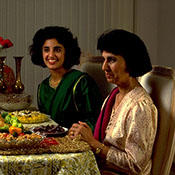 Muslims fast from sunrise to sundown during the month of Ramadan. In addition to abstaining from eating and drinking, those who fast also restrain themselves from evil thoughts, speeches, and actions. Eid al-Fitr is celebrated at the end of Ramadan and is one of the most anticipated Islamic holidays.
Muslims fast from sunrise to sundown during the month of Ramadan. In addition to abstaining from eating and drinking, those who fast also restrain themselves from evil thoughts, speeches, and actions. Eid al-Fitr is celebrated at the end of Ramadan and is one of the most anticipated Islamic holidays.
View Full Album
Ramadan is the ninth month of the Islamic lunar calendar. During this month, Muslims observe a complete fast from dawn until sunset. The observance of the fast in Ramadan, or sawm, is considered to be one of the Five Pillars of Islam and is detailed in the Qur’an:
“It was in the month of Ramadan that the Quran was revealed as guidance for humanity, clear messages giving guidance and distinguishing between right and wrong. So any one of you who is present that month should fast, and anyone who is ill or on a journey should make up for the lost days by fasting on other days later. God wants ease for you, not hardship. He wants you to complete the prescribed period and to glorify Him for having guided you, so that you may be thankful.” (Qur’an 2:185)
The fast of Ramadan encourages self-restraint, God-consciousness, compassion, and collective worship. During the daylight hours, Muslims abstain from eating, drinking, and sexual activity, while striving to avoid all evil speech and any bad thoughts or actions. Hence, fasting is not just of the stomach, but also of the tongue, mind, and heart, as the Prophet Muhammad is reported to have said, “Fasting is a screen; so when one is fasting, let them abstain from foul talk and from behaving impudently. If someone insults them, let them recall within themselves, ‘I am fasting’.”
Meals are taken before dawn and after sunset, known respectively as suhoor and iftar. At dusk, many gather to break the fast by eating dates and drinking water, following the example of the Prophet Muhammad. The nights of Ramadan are a time for families and friends, often a festive occasion with special foods. Many mosques offer special prayers known as salat al-tarawih, in which the entirety of the Qur’an is recited gradually throughout the month. On Laylat al-Qadr, the “Night of Majesty” on which Muhammad received the first verses of the Qur’an, much of the community gathers in the mosque to engage in collective worship and festivities. This includes extended nightly prayer services as well as salat al-tarawih, collective du’a, recitation of litanies, speeches and talks, and the passing out of special treats and desserts; many choose to stay up all night, praying, reciting the Qur’an, engaging in collective festivities, and partaking in the pre-dawn meal with others.
At the end of the month of fasting, Muslims celebrate with observance of the holiday Eid al-Fitr, “the Festival of Breaking the Fast.” The day starts with performing a special prayer service at the mosque, known as salat al-eid. This includes performance of the Eid salat followed by a sermon from the imam. Many Muslims attend along with their families and children, dressing in their best clothes. In Atlanta, the imams of ten local mosques gather to coordinate the observance; in Houston, Muslims gather at the George R. Brown Convention Center in Downtown Houston at a celebration organized by the Islamic Society of Greater Houston (ISGH). After the prayer service, many mosques host festivals and carnivals with food, games, and rides for children, along with bazaars and other vendors. Some Muslims, in addition to paying the required zakat al-fitr, a unique alms-tax for the needy on Eid, perform additional acts of charity on this day. Portland, Oregon’s Muslim Educational Trust coordinates an annual Eid Toy Drive, collecting toys for needy children. Eid al-Fitr is also a time to visit friends and relatives, and many Muslims celebrate with their families for two or three days. Children receive new clothes, jewelry, toys and other gifts, and parents inculcate in their children the importance of observing the fast and serving God in this month, in addition to rejoicing in celebrations and festivities with friends, family, and the broader community.